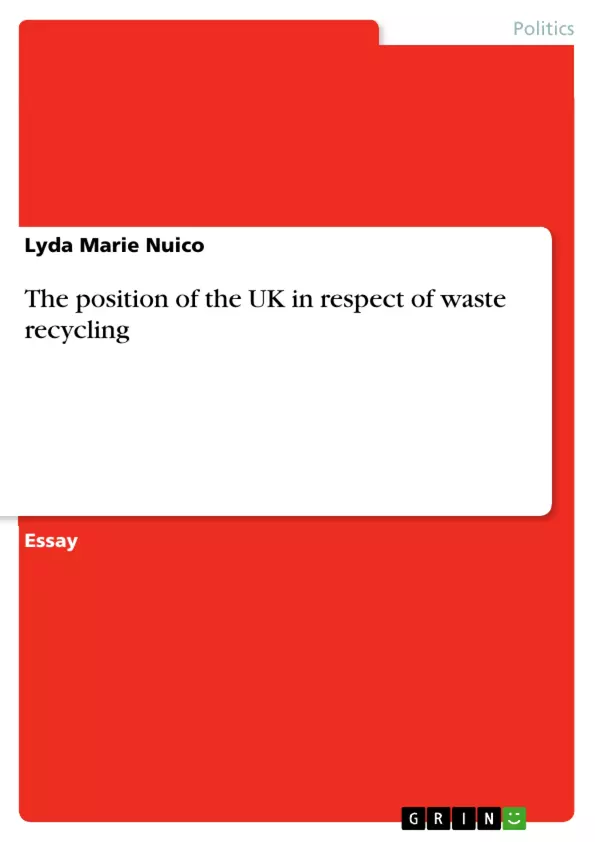This paper lays out the current situation of the waste recycling efforts in UK with an aim geared towards the analysis of its current challenges and opportunities and what solutions can be implemented to improve UK’s position in the European Union.
In the natural world, nothing goes to waste. Waste is nonexistent. Every morsel of a fox’s droppings is part and parcel of the intricate closed-loop system that is nature where the same could nourish a berry bush’s growth thereby providing food for birds which will then eat those berries and ultimately, the bird will, at some point, becomes a meal for the fox. Hence, every waste produced by nature is simply a resource waiting to be utilized by another organism.
In England, the household recycling rate has shown a considerable improvement since 2008 with an increase of 43% from 35%. In Wales, only 54% of its current municipal waste gets recycled. However, an online panel survey on trends in attitude and self-reported behavior conducted by the Waste Reduction Awards Program (WRAP) in 2011 revealed that 60% of residents in Wales claim that recycling is “very important” to them and even with the act requiring additional effort, 78% of people in Wales are shown to more likely recycle, a stark difference in comparison to its Scottish neighbor with only 51% of its populace labeling recycling as “very important.” (Defra, 2013).
Inhaltsverzeichnis (Table of Contents)
- INTRODUCTION
- 1.0 Economics of Waste management in UK
- a) Recycling
- a.1.) Metal and Electronic waste recycling
- a.2.) Rise of global plastics
- a.3.) Recycling of greenhouse gases
- 2.0 Barriers to Effective Recycling:
- a.) Four Principal barriers to recycling at home according to WRAP
- a.1.) Recent developments
- b.) Economic Barriers
- c.) Technical Barriers
- 3.0 Practical Considerations:
- 4.0 Political Climate…........
- 5.0 The Waste Hierarchy
Zielsetzung und Themenschwerpunkte (Objectives and Key Themes)
This paper examines the current state of waste recycling efforts in the UK, analyzing its challenges and opportunities. It aims to identify solutions that can improve the UK's position within the European Union.
- Economic viability of different waste management methods, particularly recycling
- Barriers to effective recycling, including economic, technical, and behavioral factors
- The role of technology and infrastructure in enhancing recycling processes
- The importance of raising awareness and promoting sustainable waste management practices
- The impact of the EU Landfill Directive on waste management in the UK
Zusammenfassung der Kapitel (Chapter Summaries)
- INTRODUCTION: This chapter introduces the concept of waste management in the natural world, highlighting the closed-loop system of resource utilization. It also provides an overview of recycling rates in England and Wales, highlighting the importance of waste recycling efforts.
- 1.0 Economics of Waste Management in UK: This chapter focuses on the economic aspects of waste management, discussing gate fees for different waste management methods. It emphasizes the economic viability of recycling compared to other methods.
- 2.0 Barriers to Effective Recycling: This chapter explores the various barriers to effective recycling, including economic, technical, and personal barriers. It highlights the importance of addressing these barriers to improve recycling rates.
Schlüsselwörter (Keywords)
Waste management, recycling, economic barriers, technical barriers, EU Landfill Directive, sustainable waste management, circular economy, waste hierarchy, material recovery, greenhouse gas emissions.
Frequently Asked Questions
What is the current recycling rate in the UK?
Household recycling rates in England improved to 43% by 2013, while Wales reached about 54% of its municipal waste.
What are the main barriers to effective recycling in the UK?
Barriers include economic factors, technical limitations, and behavioral patterns among residents at home.
What is the "Waste Hierarchy"?
It is a priority order for waste management, emphasizing reduction and reuse over recycling and disposal.
How does the EU Landfill Directive impact UK waste management?
It pushes the UK to reduce the amount of biodegradable waste sent to landfills, encouraging more sustainable recycling practices.
Is recycling economically viable in the UK?
The paper analyzes gate fees and the economics of material recovery, showing that recycling can be more viable than traditional disposal methods.
- Citar trabajo
- Lyda Marie Nuico (Autor), 2016, The position of the UK in respect of waste recycling, Múnich, GRIN Verlag, https://www.grin.com/document/317820



